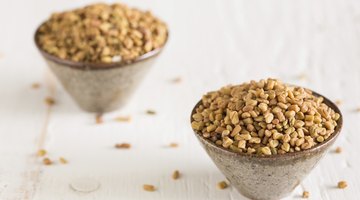Kava-Kava & Pregnancy
The medicinal herb kava-kava, which originates in the South Pacific, can combat anxiety symptoms as effectively as many prescription drugs. According to the National Institutes of Health, kava-kava rivals the efficacy of Valium and Buspar, and may produce fewer side effects. Because of kava-kava's natural origins, many women are interested in using it as a holistic alternative to prescription anxiety treatments during pregnancy. However, there is not enough evidence to recommend the use of kava-kava during any stage of pregnancy.
Benefits
Kava-kava offers an array of benefits to people suffering from anxiety disorders. According to the University of Maryland Medical Center, kava-kava dramatically reduces anxiety symptoms after just one week of ongoing treatment. Many conventional treatments for anxiety, such as the prescription drug Valium, are firmly contraindicated for pregnant women because they pose a known threat to the developing fetus. In theory, kava-kava may act as a safer alternative to these powerful prescription drugs.
Considerations

Valerian Root Vs. Valium
Learn More
Citing a lack of scientific evidence, the American Pregnancy Association regards kava-kava as "possibly unsafe" for use during pregnancy. No studies have confirmed that kava-kava is or isn't an acceptable anxiety treatment during pregnancy. In theory, weak toxins in kava-kava can damage the developing liver of the fetus and central nervous system. This could cause stillbirth or other serious complications. Until clinical trials have confirmed that the herb's benefits outweigh its risks for expectant mothers, most practitioners err on the side of caution and recommend against its routine use.
Pregnancy Risks
Most of kava-kava's risks during pregnancy are theoretical, but a few studies indicate several possible risks. According to the NIH, kava-kava can weaken the muscles in the uterus, leading to pregnancy complications. The UMMC also notes that kava-kava can prolong the effects of anesthesia; this could cause problems if a mother requires sedation for a cesarean section or other surgery. Furthermore, compounds in kava-kava can pass into breast milk and harm a breast-fed newborn.
Other Side Effects

Is Valerian Root Safe During Pregnancy?
Learn More
Pregnant women taking kava-kava may experience side effects ranging from mild to life-threatening. The UMMC reports that kava-kava's most common side effects include fatigue, dizziness, restlessness, upset stomach and tremors. Several case reports have linked kava-kava to liver diseases such as cirrhosis and hepatitis. Although rare, these complications could be lethal for the mother or fetus. If your health care provider recommends that you take kava-kava, immediately report any side effects.
Alternatives
Several natural treatments can provide relief from anxiety symptoms with fewer risks than kava-kava or prescription drugs. Engage in light exercise every day and make time to socialize with friends and family members. With the approval of your health care provider, consider seeking help from a qualified aromatherapy practitioner or massage therapist. Counseling, meditation, yoga and relaxation exercises can also help reduce anxiety symptoms without the risk of serious side effects during pregnancy.










